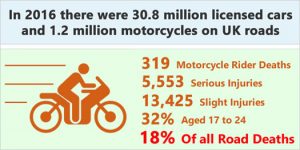New and Young Motorcycle Rider Tips
Becoming a motorcycle rider is a reasonably quick and affordable route to mobility and independence. The traditional route of learning to drive a car, purchasing a vehicle and taxing / insuring it is a huge financial burden and therefore a skill that is often unobtainable at a young age.
Little wonder then why so many young people opt for the motorcycle or moped. Though this new-found sense of freedom is fun (and so it should be), you also need to be aware of the dangers associated with riding a motorcycle, particularly if you’re a new, young and inexperienced rider.
New and young riders statistically have much higher chance of being involved in an accident. Based on Department for Transport statistics, there were 319 motorcycle fatalities in 2016 which equates to 18% of all road deaths during that year.
Considering that motorcycles make up only around 3% of traffic, it’s a high statistic. Total motorcycle casualties during the same period; including fatalities, serious and slightly injured was 19,297 and 32% of those motorcycle riders were aged 17 to 24.
Young Motorcycle Riders
Whilst it’s important to enjoy riding a motorcycle, it’s also important to know your limits. Due to inexperience and age, new and young motorcycle riders are the most vulnerable. Many accidents can often be the result of:
- Inexperience, an inability to correctly judge a situation
- The natural excitement and energy of youth
- A lack of maturity and the ability to appreciate the serious nature of riding a motorcycle
- Showing off
- Riding competitively / racing
- Overconfidence

Many young and inexperienced motorcyclists believe that their ability to handle a motorcycle means that they’re a good rider. The ability to handle a motorcycle well is of course essential, but only represents one of the many skills required in becoming a safe rider. The ability to read the road ahead, understand your surroundings and to correctly act on that information is a skill that takes time to learn. As a new and young rider, you should avoid:
- Riding too fast – excessive speed is often associated with fatal accidents
- Being distracted – road incidents can occur very quickly and can easily develop from a potential hazard to an accident if you’re not concentrating
- Riding beyond your capabilities – young and new riders can easily become overconfident and fail to recognise that to become a good and safe rider requires many skills that take time to develop
- Getting angry – there will always be road users that act in a way that causes anger. Keep calm, let it go and simply ignore the stupid actions of others
- Riding without consideration – whilst it’s important that you do not become the instigator of road rage, it’s equally important that you avoid provoking. A lack of consideration and safety around other road users can quickly cause a minor situation to escalate.
